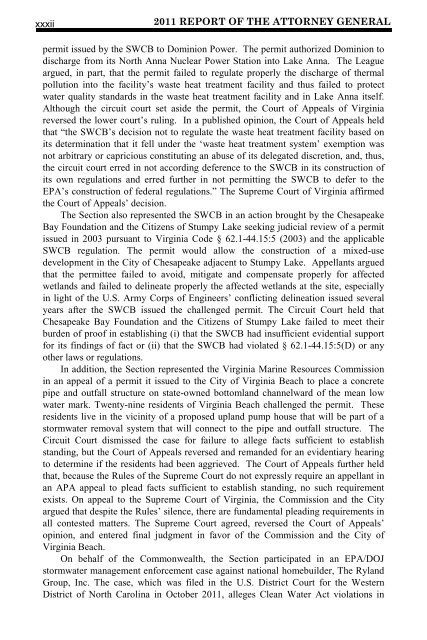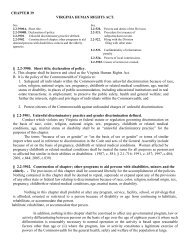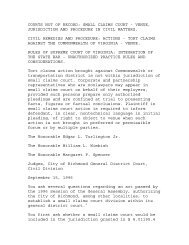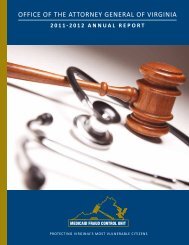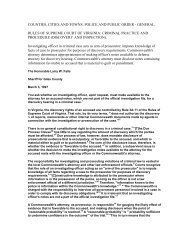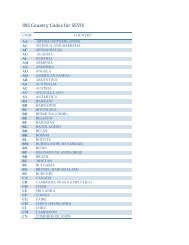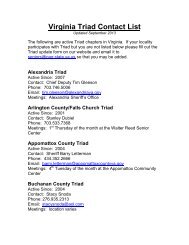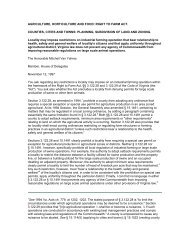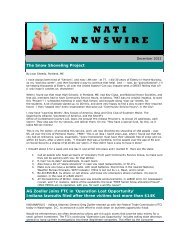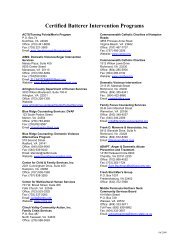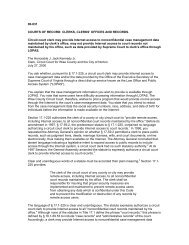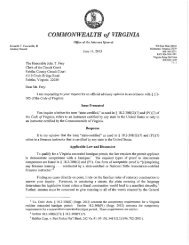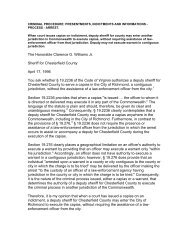2011 Annual Report - Virginia Attorney General
2011 Annual Report - Virginia Attorney General
2011 Annual Report - Virginia Attorney General
You also want an ePaper? Increase the reach of your titles
YUMPU automatically turns print PDFs into web optimized ePapers that Google loves.
xxxii<br />
<strong>2011</strong> REPORT OF THE ATTORNEY GENERAL<br />
permit issued by the SWCB to Dominion Power. The permit authorized Dominion to<br />
discharge from its North Anna Nuclear Power Station into Lake Anna. The League<br />
argued, in part, that the permit failed to regulate properly the discharge of thermal<br />
pollution into the facility’s waste heat treatment facility and thus failed to protect<br />
water quality standards in the waste heat treatment facility and in Lake Anna itself.<br />
Although the circuit court set aside the permit, the Court of Appeals of <strong>Virginia</strong><br />
reversed the lower court’s ruling. In a published opinion, the Court of Appeals held<br />
that “the SWCB’s decision not to regulate the waste heat treatment facility based on<br />
its determination that it fell under the ‘waste heat treatment system’ exemption was<br />
not arbitrary or capricious constituting an abuse of its delegated discretion, and, thus,<br />
the circuit court erred in not according deference to the SWCB in its construction of<br />
its own regulations and erred further in not permitting the SWCB to defer to the<br />
EPA’s construction of federal regulations.” The Supreme Court of <strong>Virginia</strong> affirmed<br />
the Court of Appeals’ decision.<br />
The Section also represented the SWCB in an action brought by the Chesapeake<br />
Bay Foundation and the Citizens of Stumpy Lake seeking judicial review of a permit<br />
issued in 2003 pursuant to <strong>Virginia</strong> Code § 62.1-44.15:5 (2003) and the applicable<br />
SWCB regulation. The permit would allow the construction of a mixed-use<br />
development in the City of Chesapeake adjacent to Stumpy Lake. Appellants argued<br />
that the permittee failed to avoid, mitigate and compensate properly for affected<br />
wetlands and failed to delineate properly the affected wetlands at the site, especially<br />
in light of the U.S. Army Corps of Engineers’ conflicting delineation issued several<br />
years after the SWCB issued the challenged permit. The Circuit Court held that<br />
Chesapeake Bay Foundation and the Citizens of Stumpy Lake failed to meet their<br />
burden of proof in establishing (i) that the SWCB had insufficient evidential support<br />
for its findings of fact or (ii) that the SWCB had violated § 62.1-44.15:5(D) or any<br />
other laws or regulations.<br />
In addition, the Section represented the <strong>Virginia</strong> Marine Resources Commission<br />
in an appeal of a permit it issued to the City of <strong>Virginia</strong> Beach to place a concrete<br />
pipe and outfall structure on state-owned bottomland channelward of the mean low<br />
water mark. Twenty-nine residents of <strong>Virginia</strong> Beach challenged the permit. These<br />
residents live in the vicinity of a proposed upland pump house that will be part of a<br />
stormwater removal system that will connect to the pipe and outfall structure. The<br />
Circuit Court dismissed the case for failure to allege facts sufficient to establish<br />
standing, but the Court of Appeals reversed and remanded for an evidentiary hearing<br />
to determine if the residents had been aggrieved. The Court of Appeals further held<br />
that, because the Rules of the Supreme Court do not expressly require an appellant in<br />
an APA appeal to plead facts sufficient to establish standing, no such requirement<br />
exists. On appeal to the Supreme Court of <strong>Virginia</strong>, the Commission and the City<br />
argued that despite the Rules’ silence, there are fundamental pleading requirements in<br />
all contested matters. The Supreme Court agreed, reversed the Court of Appeals’<br />
opinion, and entered final judgment in favor of the Commission and the City of<br />
<strong>Virginia</strong> Beach.<br />
On behalf of the Commonwealth, the Section participated in an EPA/DOJ<br />
stormwater management enforcement case against national homebuilder, The Ryland<br />
Group, Inc. The case, which was filed in the U.S. District Court for the Western<br />
District of North Carolina in October <strong>2011</strong>, alleges Clean Water Act violations in


